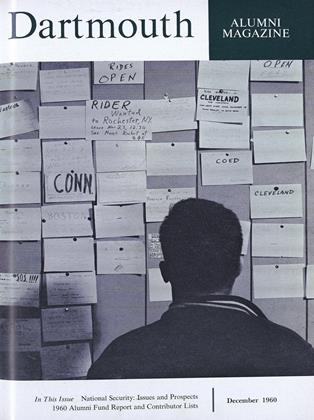IN the face of rising admission pressure and something less than general understanding of the policies they follow in picking their entering classes, the eight Ivy League colleges last month jointly issued a memorandum to secondary schools explaining these policies - and stressing that high marks and test scores are not the only things that count. The printed memorandum served also to straighten out some of the trouble created for the Ivy League colleges this fall by misleading newspaper stories about their admission procedures.
The eight institutions — Brown, Columbia, Cornell, Dartmouth, Harvard, Pennsylvania, Princeton and Yale — stated that they were "acutely conscious of the national distress created by current college admission pressures. One of the many perplexing aspects for parents, candidates, and school guidance officials is the bewildering variety of procedures followed by America's colleges and universities. Aware of the broad public interest in these matters, we wish to clarify our common practices. Complete uniformity is neither possible nor necessarily desirable, but it is our hope that mutual recognition tate effective communication between schools and our admissions offices, provide a more orderly admissions process, and offer an equitable basis for consideration of candidates."
The memorandum said candidates are expected to file formal applications in the fall of senior year in secondary school, and preferably before January 1. No preferential treatment is given for earlier application. Content and quality of school work are of primary importance, and attention is given to honors classes, advanced courses, rank in class, and CEEB test scores.
"Deeply interested as we are in intellectual promise," the Ivy League colleges state, "we disavow a sole reliance on transcripts and test scores for selection." A detailed confidential report on the candidate's personal qualities from a school official familiar with him is desired. These "qualities other than academic also play a significant part in our selection process," the colleges affirm, and since it is not a simple matter "to consider the 'whole' candidate and all those aspects of his environment which may help predict his development in college and subsequently," the help and understanding of the school guidance counselors are asked for.
Personal interviews in some cases are helpful, but chances of admission are not hurt by the lack of an interview, the memorandum states. It also says, "We subscribe to the use of alumni representatives in our secondary school programs and are currently seeking to establish a code which we hope will guide these representatives in serving schools and candidates effectively."
 View Full Issue
View Full Issue
More From This Issue
-
 Feature
FeatureNATIONAL SECURITY: Issues and Prospects
December 1960 By LOUIS MORTON, -
 Feature
FeatureINSTITUTIONAL PURPOSE in the Undergraduate College
December 1960 -
 Feature
FeatureUNDERWATER TREASURE
December 1960 -
 Feature
FeatureThe Man Behind the Figures
December 1960 -
 Feature
FeatureALUMNI FUND ENDOWMENT FUNDS
December 1960 -
 Feature
FeatureCollege's Annual Outlay Now Totals $12 Million
December 1960
Article
-
 Article
ArticleRADIO CLUB TO ESTABLISH PORTABLE STATIONS AT OUTING CLUB CABINS
March 1921 -
 Article
ArticleTEMPORARY SKETCHING COURSE ATTRACTS SPECIAL INTEREST
MARCH, 1927 -
 Article
ArticleBROADCASTS
October 1936 -
 Article
ArticleElected Governor of Granite State
December 1948 -
 Article
ArticleDartmouth Authors
OCTOBER 1981 -
 Article
ArticleMasthead
Mar/Apr 2006

